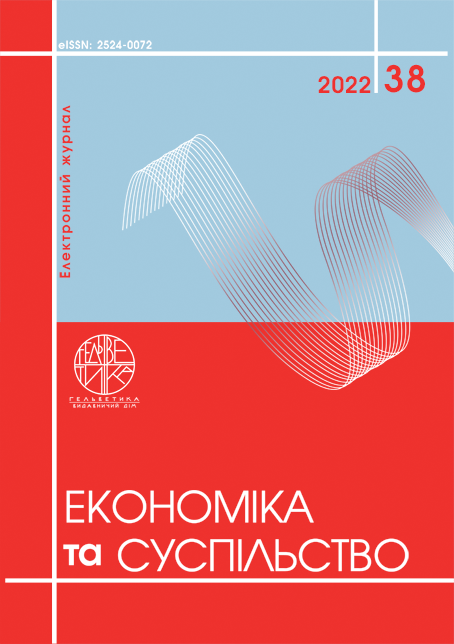SOCIAL RESPONSIBILITY OF BUSINESS AS A NECESSARY CONDITION FOR THE TRANSITION TO THE CIRCULAR ECONOMY IN UKRAINE
Abstract
The basis of a new system, an alternative to the linear economy, may be a system based on waste design and expanded producer responsibility. The circular economy is a systematic approach to economic development designed to benefit business, society and the environment. The essence of the circular model of the economy is revealed and the main advantages due to its implementation in Ukraine are determined. The state of resource management in Ukraine and the EU, in particular waste, is analyzed. It is established that in the field of waste management Ukraine lags far behind developed European countries. The new EU policy and the policy of Ukraine in the field of circular economy are analyzed. Analysis of scientific achievements on the circular economy shows that there is such terminology: digital economy, green economy, closed cycle economy. The circular economy is a systematic approach to economic development aimed at benefiting business, society and the environment. Unlike linear models, the circular economy is regenerative in design and aims gradually reduce the effect of growth from consumption limited resources. There is a consensus scientists, politicians, economists, business and environmentalists that waste needs to be generated less, collect them separately and reuse as much as possible as raw material for processing plants to not to deplete the planet's natural resources, protect the environment and move to the economy closed loop. Accordingly, the circular approach involves systemic change enterprises, governments and individuals. Taking into account the best European practices, recommendations were given to Ukraine on the transition from a traditional (linear) economy to a circular economy. It is established that in general Ukraine's policy in the field of circular economy should be formed and implemented comprehensively in the context of global trends. Realizing the scale of the negative consequences of the existing model of economic development, it is necessary to move to a new modern environmentally friendly model of a green, circular economy.
References
Ляшок О.Я. Економічна складова соціальної відповідальності бізнесу. Ефективна економіка. Дніпро : В-во ТОВ «ДКС-центр». 2017. № 4. URL: http://www.economy.nayka.com.ua/?op=1&z=6366
Подра О.П., Самсоненко М.С. Особливості впровадження та розвитку циркулярної економіки в Україні. Менеджмент та підприємництво в Україні: етапи становлення та проблеми розвитку. 2021. № 2 (6). URL: https://science.lpnu.ua/sites/default/files/journal-paper/2021/nov/25548/nzmened-304-314.pdf
Нечитайло Д. З чистого аркуша: як працює і чим вигідна циркулярна економіка. URL: https://www.epravda.com.ua/columns/2020/09/2/664626/
Руда М. Циркулярні бізнес-моделі у системі соціальної відповідальності підприємства. URL: https://evnuir.vnu.edu.ua/bitstream/123456789/17553/1/Ruda%20584-587.pdf
Зварич Р., Зварич І. Розширена відповідальність виробника в концепції розвитку циркулярної економіки. Світ фінансів. 2019. № 3(60). С. 76–86. URL: http://sf.wunu.edu.ua/index.php/sf/article/view/1246
Шкуренко О.В. Інтеграція сталого розвитку та розвитку бізнесу як домінантна основа моделі циркулярної економіки: теоретичний аспект. Вісник ХНУ імені В.Н. Каразіна. Серія «Міжнародні відносини. Економіка. Країнознавство. Туризм». 2021. Вип. 13. С. 152–165.
Руда М., Яремчук Т., Бортнікова М. Циркулярна економіка в Україні: адаптація європейського досвіду. Менеджмент та підприємництво в Україні: етапи становлення і проблеми розвитку. 2021. № 3 (1). С. 212–222. URL: https://science.lpnu.ua/uk/smeu/vsi-vypusky/vypusk-3-nomer-1-2021/cyrkulyarna-ekonomika-v-ukrayini-adaptaciya-yevropeyskogo
Кругова економіка – що це за явище, та чому воно набирає небаченої популярності у всьому світі / Передача досвіду зелених публічних закупівель зі Словаччини в Україну. URL: https://gpp.golocal-ukraine.com/krugova-ekonomika-shho-tse-za-yavyshhe-ta-chomu-vono-nabyraye-nebachenoyi-populyarnosti-u-vsomu-sviti/
Саприкіна М. У компаній з'являється голос. Найголовніші КСВ тренди у 2021 році. URL: https://delo.ua/business/jakimi-budut-trendi-korporativnoji-socialnoji-vi-381723/
. Liashok O.Ia. (2017) Ekonomichna skladova sotsialnoi vidpovidalnosti biznesu [The economic component of corporate social responsibility]. Efektyvna ekonomika [Efficient economy]. Dnipro: V-vo TOV «DKS-tsentr». № 4. Available at: http://www.economy.nayka.com.ua/?op=1&z=6366 (in Ukrainian)
Podra O.P., Samsonenko M.S. (2021) Osoblyvosti vprovadzhennia ta rozvytku tsyrkuliarnoi ekonomiky v Ukraini [Features of the introduction and development of the circular economy in Ukraine]. Menedzhment ta pidpryiemnytstvo v Ukraini: etapy stanovlennia ta problemy rozvytku [Management and entrepreneurship in Ukraine: stages of formation and problems of development]. № 2 (6). Available at: https://science.lpnu.ua/sites/default/files/journal-paper/2021/nov/25548/nzmened-304-314.pdf (in Ukrainian)
Nechytailo D. Z chystoho arkusha: yak pratsiuie i chym vyhidna tsyrkuliarna ekonomika [From scratch: how it works and how profitable circular economy]. Available at: https://www.epravda.com.ua/columns/2020/09/2/664626/ (in Ukrainian)
Ruda M. Tsyrkuliarni biznes-modeli u systemi sotsialnoi vidpovidalnosti pidpryiemstva [Circular business models in the system of social responsibility of the enterprise]. Available at: https://evnuir.vnu.edu.ua/bitstream/123456789/17553/1/Ruda%20584-587.pdf (in Ukrainian)
Zvarych R., Zvarych I. (2019) Rozshyrena vidpovidalnist vyrobnyka v kontseptsii rozvytku tsyrkuliarnoi ekonomiky [Expanded producer responsibility in the concept of circular economy development The world of finance]. Svit finansiv. 3(60). S. 76–86. Available at: http://sf.wunu.edu.ua/index.php/sf/article/view/1246 (in Ukrainian)
Shkurenko O.V. (2021) Intehratsiia staloho rozvytku ta rozvytku biznesu yak dominantna osnova modeli tsyrkuliarnoi ekonomiky: teoretychnyi aspekt [Integration of sustainable development and business development as a dominant basis of the circular economy model: theoretical aspect]. Visnyk KhNU imeni V.N. Karazina. Seriia «Mizhnarodni vidnosyny. Ekonomika. Krainoznavstvo. Turyzm». № 13. S. 152–165. (in Ukrainian)
Ruda M., Yaremchuk T., Bortnikova M. (2021) Tsyrkuliarna ekonomika v Ukraini: adaptatsiia yevropeiskoho dosvidu [Circular economy in Ukraine: adaptation of the European experience]. Menedzhment ta pidpryiemnytstvo v Ukraini: etapy stanovlennia i problemy rozvytku [Management and entrepreneurship in Ukraine: stages of formation and problems of development]. № 3 (1). S. 212–222. Available at: https://science.lpnu.ua/uk/smeu/vsi-vypusky/vypusk-3-nomer-1-2021/cyrkulyarna-ekonomika-v-ukrayini-adaptaciya-yevropeyskogo (in Ukrainian)
Kruhova ekonomika – shcho tse za yavyshche, ta chomu vono nabyraie nebachenoi populiarnosti u vsomu sviti [Circular economy – what is this phenomenon, and why it is gaining unprecedented popularity around the world / Transfer of experience in green public procurement from Slovakia to Ukraine] / Peredacha dosvidu zelenykh publichnykh zakupivel zi Slovachchyny v Ukrainu. Available at: https://gpp.golocal-ukraine.com/krugova-ekonomika-shho-tse-za-yavyshhe-ta-chomu-vono-nabyraye-nebachenoyi-populyarnosti-u-vsomu-sviti/ (in Ukrainian)
Saprykina M. U kompanii ziavliaietsia holos. Naiholovnishi KSO trendy u 2021 rotsi [Companies have a voice. The most important CSR trends in 2021]. Available at: https://delo.ua/business/jakimi-budut-trendi-korporativnoji-socialnoji-vi-381723/ (in Ukrainian)


